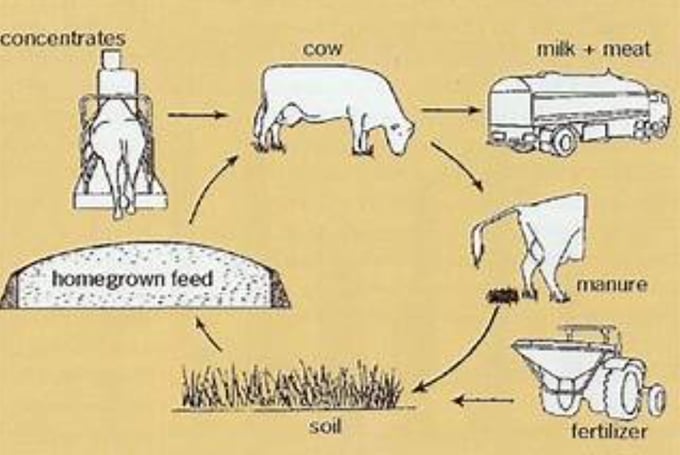May 20, 2025 | 10:44 GMT +7
May 20, 2025 | 10:44 GMT +7
Hotline: 0913.378.918
May 20, 2025 | 10:44 GMT +7
Hotline: 0913.378.918

The animal-manure-soil-feed and fodder cycle.
Denali, the nation’s leading recycler of organics, announced it has transformed over 10 billion pounds of organic byproducts into natural fertilizers. The company’s third annual sustainability report, which details findings from 2023, highlights that the company collected 1.7 billion pounds of food waste of which more than 75% was recycled into organic, nutrient-rich animal feed or uniquely curated into customized formulations by Denali’s environmental team to address dietary concerns farmers have about their cattle.
Denali’s recycled products continue to have a positive impact on the agriculture industry, delivering significant benefits to farmers, ranchers, and the sector at large.
Highlights from the 2023 report include:
Denali’s recycling efforts produced enough natural fertilizer to support more than 100,000 acres of farmland and manufactured enough animal feed to nourish over 40,000 cattle across five states.
According to U.S. EPA calculations, converting 1.3 billion pounds of food waste into animal feed resulted in an approximate avoidance of 780,000 metric tons of carbon dioxide equivalent (CO₂e) in 2023. This reduction is comparable to the greenhouse gas emissions produced by 185,641 gasoline-powered vehicles driven over the course of one year.
Fertilizer and chemicals remain the largest on-farm expenditure accounting for 17.5% of on-farm costs, with animal feed closely following at 15.5%. Denali's depackaging process enabled farmers to receive fertilizer and/or animal feed at no cost, saving them a minimum of $100 per acre.
“At Denali, our purpose is to convert organic wastes, such as unsalable food that accumulates from various sources - like retail sites across the US - into valuable products,” said Denali CEO Todd Mathes. “Our business is inherently circular, returning value from the earth back to the earth by taking organic byproducts originally destined for the landfill and recycling them to save farmers money and advance the circular economy. Through our customized service offering, we connect with farmers across the country to offer fertilizer and animal feed tailored to their specific needs. Looking ahead, we have our sights set on delivering an even greater impact for more producers and the agriculture industry as a whole.”
Food waste is one of many organic waste streams that Denali converts into valuable products as part of its mission to provide the best recycling solutions for a healthier planet. The company collects food waste from thousands of generators, including major retailers like Whole Foods Market and Albertson’s, as well as food manufacturers and distributors, hotels, stadiums, universities, and cafeterias across 48 states and Puerto Rico.
Most recently, Denali launched depackaging technology across the US, providing customers such as grocery retailers, municipalities, stadiums, restaurants and more, a way to collect and recycle wasted food items without having to manually separate organic contents from their packaging more easily. The depackaging technology automatically separates food from its packaging materials like plastic and cardboard, producing a cleaner stream of organic material that can be turned into animal feed, compost or converted into energy with anaerobic digesters.
feedstuffs

(VAN) For years, the CRISPR-Cas9 genome technology has been reshaping genetic engineering, a precision tool to transform everything from agriculture to medicine.

(VAN) Vietnam aims to become a 'leader' in the region in the capacity and managing effectively soil health and crop nutrition.
![Reducing emissions from rice fields: [Part 1] Farming clean rice together](https://t.ex-cdn.com/nongnghiepmoitruong.vn/608w/files/news/2025/05/05/z6509661417740_a647202949c539012a959e841c03e1d3-nongnghiep-143611.jpg)
(VAN) Growing clean rice helps reduce environmental pollution while increasing income, allowing farmers to feel secure in production and remain committed to their fields for the long term.
/2025/05/19/5136-1-144800_230.jpg)
(VAN) The Nghe An Provincial People's Committee has just approved the list of beneficiaries eligible for revenue from the Emission Reductions Payment Agreement (ERPA) in the North Central region for the year 2025.

(VAN) 14 out of 35 domesticated elephants in Dak Lak province have had their living conditions improved, with 11 of them currently participating in the non-riding elephant tourism model.

(VAN) Muong Nhe Nature Reserve hopes that being upgraded to a national park will lay the foundation for forest protection efforts to be carried out in a systematic, modern, and sustainable manner.
/2025/05/16/3923-2-171845_52.jpg)
(VAN) Lower costs, higher yields, and improved soil quality are outstanding benefits that soybeans bring when integrated into the crop rotation system.